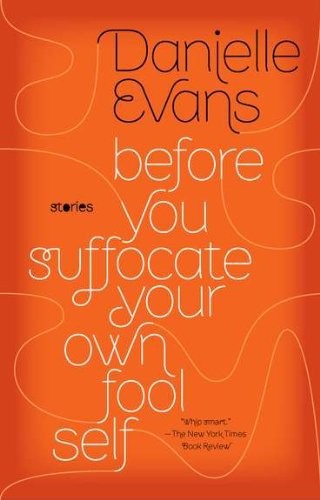
Before You Suffocate Your Own Fool Self
کتاب های مرتبط
- اطلاعات
- نقد و بررسی
- دیدگاه کاربران
نقد و بررسی

July 19, 2010
The territory Evans covers in her debut collection may be small, but she owns it. Her main characters are almost all teen girls and young women who struggle with disorder, and the reader is given close access to each one's interior, from which the muted plots originate. "Jellyfish," one of the better stories, starts out with the plight of middle-aged William, whose roof has just collapsed, before settling on his adult daughter, Eva, and examining her life. The two friends in "Virgins," the opening and best story, maneuver unsteadily through the minefield of casually predatory men and boys. "Snakes" looks back on a consequential summer in the lives of two little girls. "The King of a Vast Empire" is the biggest departure from form and is narrated by good son Terrence, who frustratedly tells the story of his free-spirited sister, Liddie. The stories are beautifully observed, though their similarities in theme and voice make them better read individually than together. Evans has some great chops that would really shine with a little more narrative breadth.

Starred review from July 1, 2010
Young, intelligent African-Americans become vehicles for their own undoing in this collection of eight stories.
Armed with no easy answers but plenty of bad choices, the talented, too-smart-for-their-own-good protagonists are painfully aware of the consequences of their actions, even when they think they have no better choice. The 15-year-old girl in "Virgins" guiltily opts for the lesser of two evils after leaving her best friend in a precarious situation. A young mixed-race girl exiled to her white grandmother's Tallahassee home for the summer learns a rough lesson in racial disparity—and the power of a lie. A traumatized Iraq War veteran who becomes a surrogate father to his ex's little daughter sees his good intentions backfire, big time, over his poor judgment. In "The King of a Vast Empire," a young man who is talked into a risky road trip with his college-coed sister recalls how shaped they both were by a childhood car accident that destroyed the structure of their family, while leaving it externally intact. After being casually cruel to the fiancé of her former lover, the drifting young woman in "Wherever You Go, There You Are" sees an opportunity for both of them to move on, even if she is not exactly ready. But the moral ambiguity of Evans's achingly believable world finds its best expression in the devastating final story, "Robert E. Lee is Dead," in which the brainy black cheerleader, CeeCee, jeopardizes her own high-school graduation with a pointless act of vandalism. Although she is instigated by her closest friend Geena, whose future is less bright, CeeCee's decision is her own. She shares this characteristic with the other survivors in this arresting book, along with the regret.
A welcome new talent—with a funny and dark take on being black in America.
(COPYRIGHT (2010) KIRKUS REVIEWS/NIELSEN BUSINESS MEDIA, INC. ALL RIGHTS RESERVED.)

September 1, 2010
This debut collection is contemporary, powerful, and very real. While race is a factor throughout, with biracial characters, mixed-race romantic relationships, and plenty of interaction among people of different ethnicities, it remains subsidiary to themes like family relationships, romantic attachments, coming-of-age, belonging, and searching or yearning for direction in life. In "Virgins," for instance, two teenage best friends both share and compete until one gets just a bit ahead with a boy. In "Snakes," nine-year-old Allison and her adoptive sister summer with their grandmother, contending with her strict rules and the legacy of their mom. A broad cast of characters fills these pages, from working class to privileged, from modest to exceptional, including a high school valedictorian, Ivy League students, professors, and successful businesspeople. "Jellyfish" captures the range, featuring a man finally moving from Harlem to Brooklyn when his roof caves in, who's late for lunch as always with his conscientious artist daughter. VERDICT A smartly written and enjoyable collection from an up-and-coming author; particularly recommended for those interested in contemporary relationships in our increasingly diverse and global society.--Sarah Conrad Weisman, Corning Community Coll. Lib., NY
Copyright 2010 Library Journal, LLC Used with permission.

August 1, 2010
Evans first collection of short stories deals thoughtfully and incisively with considerations of class, race, and coming-of-age. That six of the stories are told in their female or male protagonists first-person voices brings them immediacy and emotional resonance. Sometimes, though, this device results in narrative voices that sound too much alike while the stories they tell lack thematic originality. Interestingly, two of the best storiesSomeone Ought to Tell Her Theres Nowhere to Go, about a deeply troubled veteran of the Iraq War, and Jellyfish, about the fraught relationship of a young woman and her fatherare told in third person. Yet, whether told in first or third person, what all of the stories share is a demonstration of the profound influence of the past on the present-day lives of their characters and the intricacies of relationships among African American, white, Hispanic, and mixed-race young people. Clearly, Evans lives up to her reputation as an important new voice in literary fiction.(Reprinted with permission of Booklist, copyright 2010, American Library Association.)

























دیدگاه کاربران